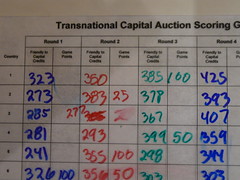Yesterday I was up in Alsip, Illinois, at the IBEW Apprenticeship school to help out with our "Solidarity 101" program. This is a two-day crash course in Labor Studies taught by the Labor Education faculty. We are outsiders coming into an ongoing educational process, and we get the good and the bad from that position.
My role in this program has been to teach sessions on contemporary economics, particularly on globalization. That's right, globalization in 2 hours. I've been jiggering my lesson since day one, and finally have found something that works: a lesson plan by Bill Bigelow called the "Transnational Capital Auction," which is in two of his books, Rethinking Globalization and The Line Between Us: Teaching about the Border and Mexican Immigration. You can get it from Rethinking Schools.
It's a remarkably effective lesson plan for explaining the "Race to the Bottom" concept, and for understanding the pressures on developing nations to lower their living standards. It's also a very hands-on example of how ideology works to conform social actors to the needs of capital.
Students break into teams. They play the role of ruling elites in developing, post-colonial nations. I play the role of Transnational Capital. The goal is to get some development capital into your country. Over five rounds, teams bid on my investment. Bids are figured through a set of social indicators (minimum wage, child labor, worker rights, and environmental laws, and taxation on profits). The worse your social indicators, the higher your "friendly to capital" score. But you can't just grind your people into the ground. The team with the third highest "friendly to capital" points gets the most "Game Points," which is what you need to win. This last rule makes the game more strategic and more engaging for students. But the educational point is that "Capital" wants a balance between poverty and order. Too much poverty brings disorder, and potential revolution, and that's bad for capital. The students "get it."
During the bidding, I circulate around the room reiterating the basic outlines of the game, collecting bids, and promoting the interests of capital: "remember, winning is everything;" "remember, you have to compete against the other teams, you don't want those other countries to get ahead of you, do you?" I notice that most are opting strategically for high wages and bad conditions--"at least we'll eat," they say. "What is the largest piece of an employers budget?" I ask. "Wages and benefits," they say. In the next round, minimum wages drop.
The trend of game is usually the same: the friendly to capital scores go up round after round, sometimes dramatically as teams try to catch up or strategically bid high to win some Game Points. Their bid in the final round, you tell them, is what their people will have to live with. "So what is life like for common people in your country now?" I ask. Minimum wage of 25 cents an hour, no child labor laws, troops stationed in the factories. In short, "Hell," they respond.
Time's up. Go to your next class. Half the class stays with me, the other is off to learn about the impact of recent elections on labor law, etc.
My sections replay the Auction, this time not as elites but as representatives of workers, farmers, etc. They struggle to do well by their constituents, but the logic of the game moves them toward declining wages and conditions. "Remember, winning is everything" I say in my role as "capital." One team asks alound, "What if we all got together. We could agree on minimum wages." I stop talking and try to hide in the corner so they can organize. The response from other teams: "now you say that, but you were just trying to cut our throats. It's every man for himself"--this is actually said by one of the few women in the room. "Winning is everything," I say trying hard to be ironic. But the game moves on to the inevitable conclusion: "hell."
In the wrap up, the students talk about how they felt powerless to resist the logic of the game. We talk about what life would really be like for workers under these conditions, and what people might do in response. They might leave their homes and come to the US, someone says. But there really isn't enough time to go into a long discussion, just enough to reiterate that "capital" is seen as "America" in many parts of the world, and to mention something about Lula and other leaders who are trying to avoid what they just did: play the transnational capital auction for the benefit of common people. Not so easy to do.
Global | Local | Middle
Thursday, December 07, 2006
Subscribe to:
Post Comments (Atom)


No comments:
Post a Comment